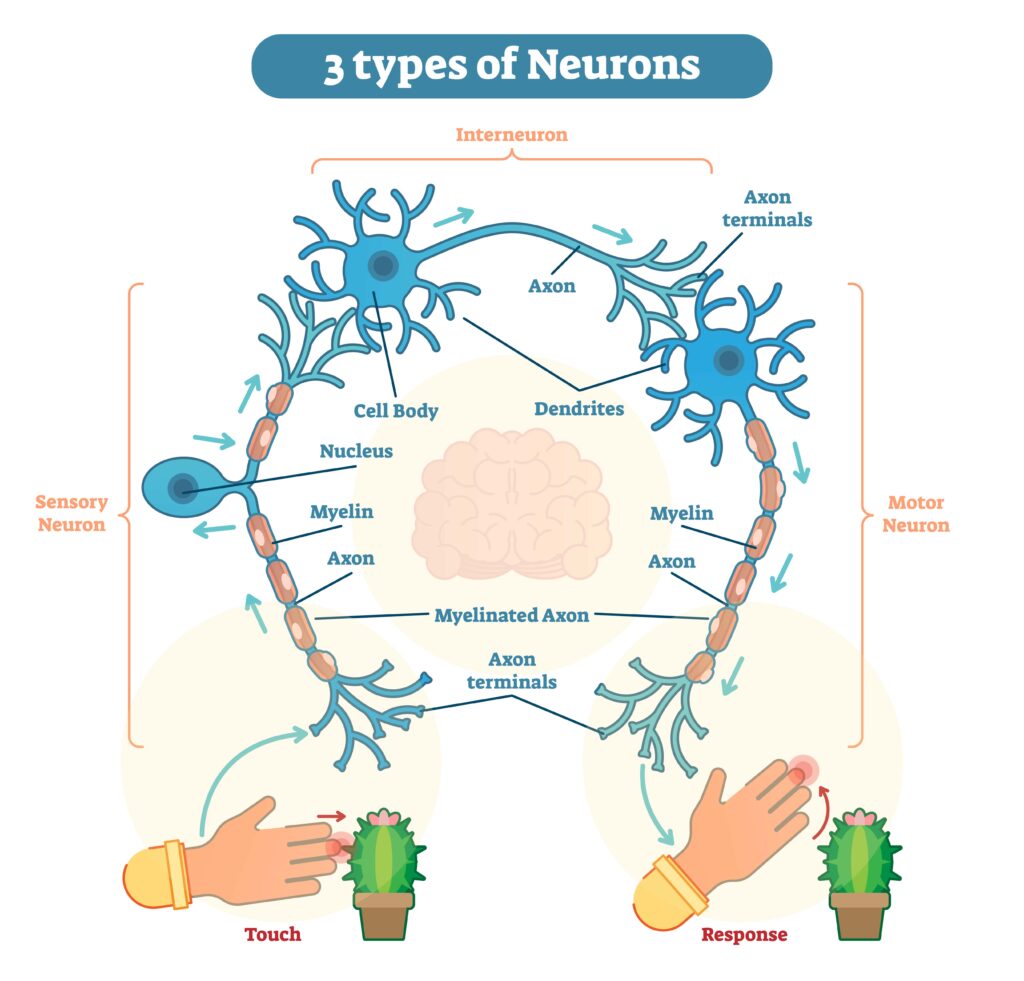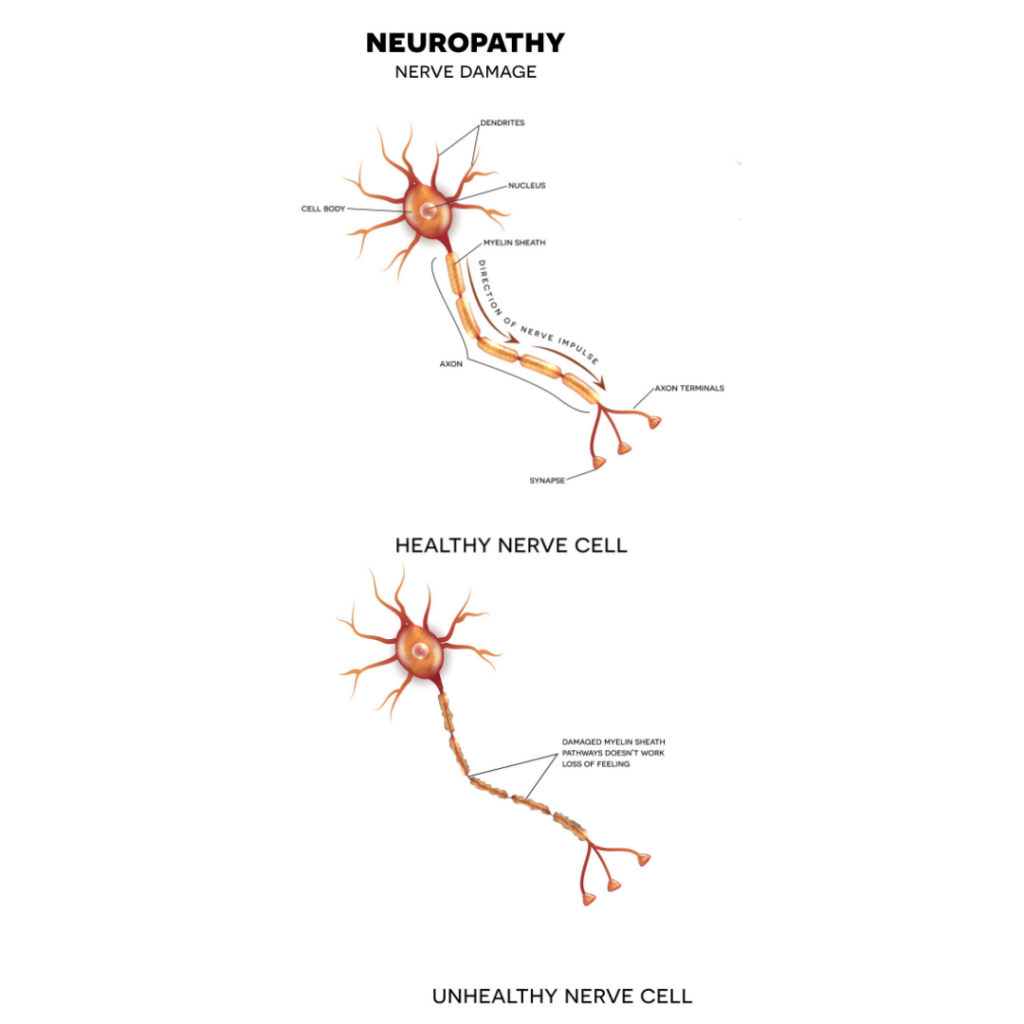Nerve damage can be a debilitating condition that affects millions of people each year. There are two main types of nerves in the body- sensory and motor- and each can be affected by damage. There are many different causes of nerve damage, some more common than others. In this blog post, we will take a closer look at how different types of nerves are affected by damage and the most common causes of nerve damage.

Types of Nerves
As mentioned above, there are two main types of nerves. Each type of nerve has its own function, and therefore, its own reaction to nerve damage.
Sensory Nerves
Sensory nerves are part of the peripheral nervous system and are responsible for transmitting information from the body to the brain. This can include information about touch, temperature, pain, and more. When these nerves are damaged, it can cause problems with sensation in the damaged area. This can include symptoms such as pain, burning, tingling or prickling, sensitivity, numbness, or problems with positional awareness.
Motor Nerves
Motor nerves are also part of the peripheral nervous system and are responsible for transmitting information from the brain and spinal cord to the muscles. This allows us to move our muscles and perform everyday tasks. When motor nerves are damaged, it can cause weakness, twitching, or paralysis in the muscles.
The Most Common Causes of Nerve Damage
Diabetes
The most common cause of nerve damage is diabetes. Diabetes can damage the nerves by causing them to swell and press against blood vessels. Since sensory nerves are the most likely to be affected, this can cause a loss of sensation or weakness in the affected area. However, diabetes can also cause damage to the autonomic and motor nerves as well, although this is not as common.
Infectious Diseases
Infectious diseases, such as HIV/AIDS, herpes viruses, hepatitis C, and Lyme disease, can damage the nerves by causing inflammation and/or gradually destroying the body’s immune system. This can lead to a loss of sensation or weakness in the affected area, as well as various other symptoms. Acute infections tend to come on quickly, while chronic infections develop slowly but are progressive and often fatal.
Cancer
Cancer can damage the nerves by growing into them or pressing against them. Certain types of cancer, such as lymphoma or multiple myeloma, can also cause neuropathy as a symptom. This can cause a loss of sensation or weakness in the affected area. Cancer can also cause nutritional deficiencies resulting in reduced nerve function. In some cases, treatments used for cancer, such as chemotherapy and radiation, can also lead to nerve damage and pain.
Autoimmune Diseases
Autoimmune diseases, such as lupus, inflammatory bowel disease, Guillain-Barre syndrome, and multiple sclerosis, can cause nerve damage and pain. This is because these autoimmune conditions may cause the immune system to damage the nerves by attacking them. This can lead to a loss of sensation or weakness in the affected area.

Trauma
Trauma, such as a car accident or a fall, can damage the nerves by crushing them. This can cause a loss of sensation or weakness in the affected area. In some cases, nerves can also be crushed, or compressed, by other factors such as surgery, herniated discs, carpal tunnel syndrome, or bone spurs.
Drugs/Toxins
Certain drugs, such as chemotherapy and HIV medications, can damage the nerves. Excess alcohol consumption has also been associated with causing nerve damage. Finally, the accidental ingestion of toxins such as arsenic, lead, and mercury can also cause nerve damage. This can lead to a loss of sensation or weakness in the affected area.
Nutritional Deficiencies
Vitamin B12 deficiency is one of the most common causes of nerve damage. This vitamin is essential for the health of the nervous system, and a deficiency can cause problems with sensation and movement. Deficiencies in vitamin B6 can also cause nerve damage and pain. Nutritional deficiencies can be the result of excess alcohol consumption, poor nutrition, or a medical condition that affects the absorption of nutrients.
Motor Neuron Diseases
Motor neuron diseases, such as ALS, can damage the nerves by causing them to degenerate and lose their function over time. This can lead to a loss of sensation, twitching, paralysis, weakness, or muscular atrophy in the affected area. The exact symptoms and location of symptoms will depend upon the type of motor neuron disease.
Chronic Kidney Disease
Chronic kidney disease is another common cause of nerve damage. Although the exact reasons are unknown, one theory is that kidney disease can cause electrolyte imbalances that directly affect nerve cell function, causing them to dysfunction. Another theory believes that nerves and small blood vessels become damaged since the kidneys cannot properly remove toxins from the blood.
Hormonal Imbalances
Hormonal imbalances can also cause nerve damage by altering normal metabolic processes. One example of this is diabetes, which can cause damage to the nerves as a result of high blood sugar levels. Other hormonal imbalances, such as hypothyroidism or menopause, can also lead to nerve damage and pain. Hypothyroidism, in particular, can slow metabolism, which leads to fluid retention. This causes tissues to swell and apply pressure on peripheral nerves.
In Conclusion
In this blog, we have discussed the most common causes of nerve damage. There are many other potential causes of nerve damage, but these are some of the most common. We have also explained how each type of nerve can be affected and what symptoms may result. These are just a few of the most common causes of nerve damage. If you are experiencing any symptoms, it is important to see a doctor so that they can properly diagnose and treat the problem. In many cases, nerve damage is permanent, but treatment can help to improve symptoms and quality of life. Nerve damage can be a debilitating condition, but with proper treatment, many people are able to live normal, healthy lives.

Dr. Kashouty, a diplomate of the American Board of Psychiatry and Neurology (ABPN), practices general neurology with fellowship trained specialization in clinical neurophysiology. Dr. Kashouty finds the form and function of the nerves and muscles the most interesting part of neurology, which is what led him to specialize in neurophysiology with more emphasis on neuromuscular conditions. He treats all neurological diseases, but his main focus is to treat and manage headaches, movement disorders and neuromuscular diseases.





